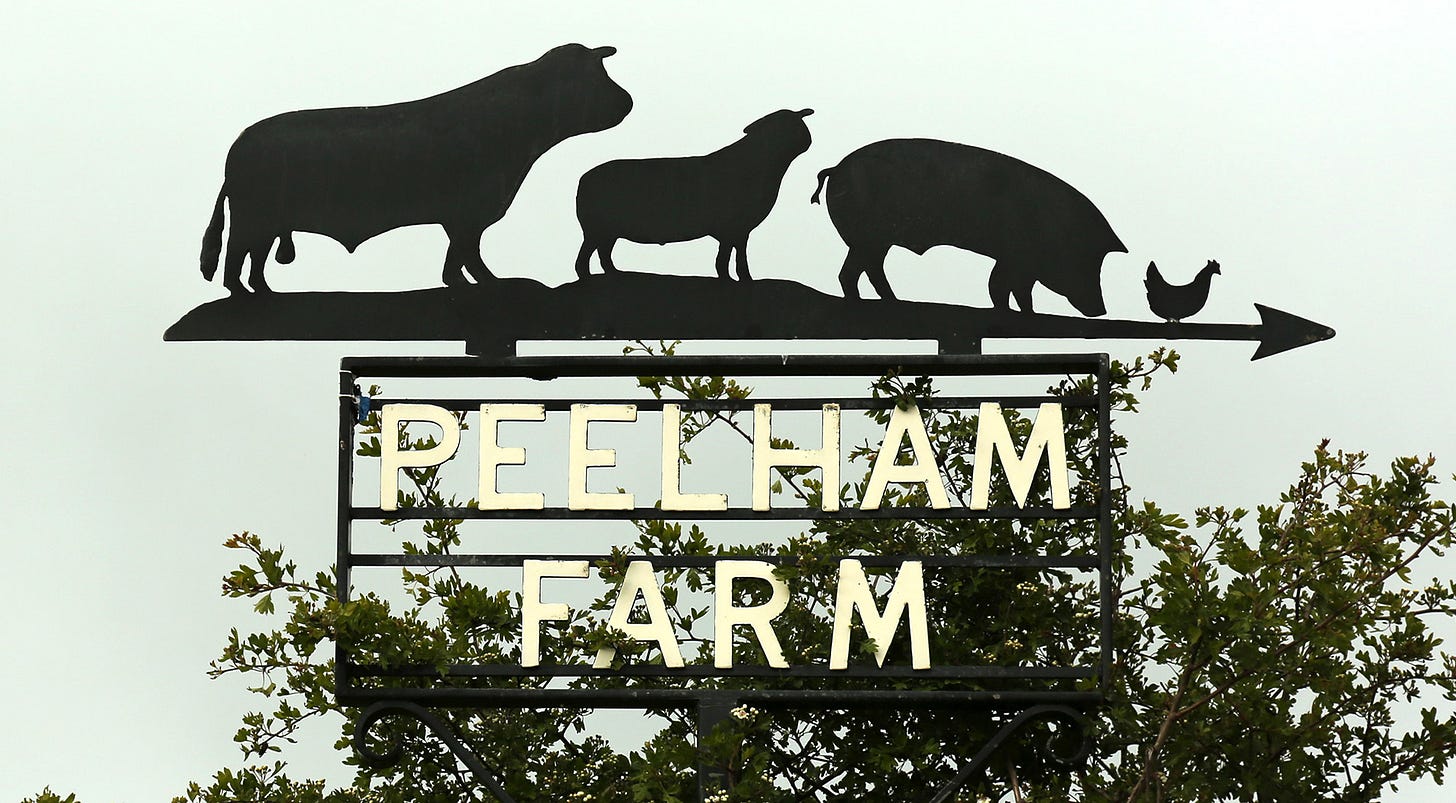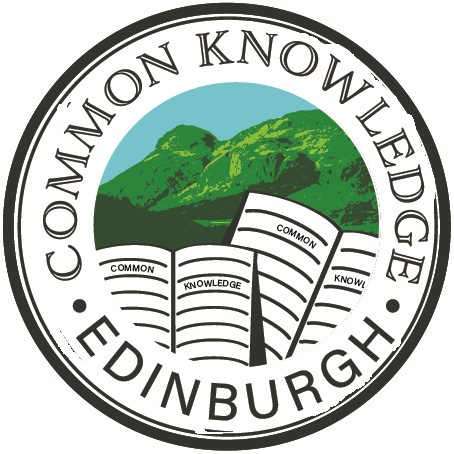REKO Ring Is Go!
Last night saw Common Knowledge's first attempt to bring consumers and producers together.
Free, 16th May, Edinburgh. Chris Cook - "Energy Markets and Geopolitics: Cook's Tour Unlimited." Tickets here. Hear about where we will be getting our energy from.
Common Knowledge was treated to a presentation by Chris and Denise, owners of Peelham Farm, as we launched our experiment in bringing consumers closer to food producers. They had set up a table of produce in the hall with some chorizo, beef chacuterie, which they kindly gave away for free, and some of their absolutely delicious bacon – which I had tested the week before as it happens when gripped by the desire for a bacon sarnie.
Peelham’s produce is nearly all from their farm, except the bacon. The pigs are raised on a neighbouring farm, where they know the standards of husbandry and the fact that they are pastured, then they are slaughtered and made into bacon at their own butchery, Denise explained to me. They had, Denise said, had pigs on Peelham, but the demand the pigs made on the land at the expense of the productivity of the cow herd meant they were faced with a choice of cows or pigs, one or the other can be reared the right way - low input, regenerative, low output - and they wanted to remain beef farmers.
Chris’ talk was about their intentions when they started to farm, how they started, their team and how they transitioned from a farm using chemicals to a regenerative farm butchering, developing and selling their own produce and the consequences that has had. The fundamental baseis for the project, and this came through strongly on the night, were family, values and the soil.
Chris and Denise’s son Angus is now part of the business and, unlike many small farms, there is a succession in place, something that Chris made clear was extremely important given that many farms do not have that and, with the average age of a farmer being sixty-five, the likelihood is that when they retire or expire the farm will be sold to an agri-business; or, even worse, a multi-national financial institution like, say, Blackrock or Vanguard, having its fields left fallow as they use it as an accounting figure in achieving a ‘Green Agenda’, although, in fact, they are actually squeezing the amount of productive farmland with the goal of raising prices of quality foodstuffs higher, allowing the billions of dollars invested by them into ‘beyond meat’ products to finally make a return. Small, family farms, retained within the lineage, are a hedge against that future and the only means to supplying natural produce.
I think everyone listening was affected by the ethics at the core of Denise and Chris’ methods at Peelham and how important it was to them both to keep true to them. Evidenced that evening when Denise corrected Chris that he was not completely accurate to say there were no preservatives in their meats at all: the bacon and the pork chacuterie had minute traces of sodium nitrates, 7 parts per million after curing, well below the standard required for organic certification, due to the fact that pork is meat that does not preserve well. Chris nodded and agreed, HUMBLED that he had been so remiss! Yes, that was, he said, the only preservative they used in all their products.
There was no need for Denise to be so transparent. In terms of the food or its impact on health, it is hardly worth mentioning. But that is their culture: high standards, high responsibility and obligation to purchasers, high ethicality. It came through in Chris’ presentation again and again. Angus was now steering the cattle on horseback as the cows responded more calmly to a horse than to a quad bike. When the herd was being corralled through the pen, the design of the pen was specifically tailored to avoid any upset to the animals. The cows were fed fodder instead of processed feed as it boosted their immune system and left them needing much, much less in the way of any pharmaceutical intervention. This meant a happier herd, a healthier herd, a more manageable herd and, in terms of produce for the buyer, a more nutritious meat.
The well-spring, the source, genesis of all of this quality is the soil, as Chris elucidated. The soil feeds the grass that feeds the herd. If the soil is depleted, the grass is deprived of benefits and the herd is diminished in nutrition. A rich soil supplies a wealth of goodness to the grass and that in turn enriches the health and appearance of the herd. In a low input, low productive model, the soil is sacrosanct. Chemicals that kill all the life and that reduce the mineral content are unthinkable. An abomination, actually.
It takes years to cultivate a soil teeming with bacterias and fungi, with richness of micro and macro-nutrients, naturally evolved. To raise animals whose bodies work well without continual chemicalisation to support(?) natural systems requires patience, knowledge and, underpinning it all, values. We are what our food eats, I read in a diet book once. What our food eats is only as good as the soil it is grown in, and the soil is only as good to the extent that it is valued and respected, by people, as an organic, living system.
In all these crucial areas, Peelham is a deeply impressive farming enterprise. They were the ideal producers to begin our attempt to side-step the middle men and go direct.
The ideas behind the REKO ring are very simple: we want to by-pass the easily controlled supermarkets and financial system as much as we can – the first showed during Covid that it is susceptible to non-governmental actors’ pressure and, also, that it is always chasing margins at the price of suppliers’ quality of product and the buyer’s health: the second, because it is becoming clear that the power that a digital currency gives the monetary system is too great for its provenly corrupt most powerful gatekeepers.
In addition to this, we want to have a relationship with our producers in order to know what is in our food, ask about developments in its production, express disapproval (or approval) directly if need be – about such things as mRNA vaccines being used – and, probably most importantly, support our suppliers in their ethical choices. We want to support smaller producers and put our money into what is nearer, more human and of higher quality; not the unnatural, distant, intensive, chemical-spraying agri-businesses that are exhausting the land and poisoning the populace.
And, we wanted to be healthy: the supermarket cares about sales and bottom lines, hence the low quality ingredients and the lacing of nearly everything with sugar – a few years ago I found sugar was an ingredient in my tinned sardines! – the local farmer with an ethical component makes money coupled with the stance that what they are doing is good for the land, good for the consumer and good for the future.
We hope those interested in freedom will support this venture. Last night, the CK community put hundreds of pounds into a local organic farm and the only added overhead was driving to Edinburgh. No renting a market stall, a shop or another person taking a cut – the farmer got the monetary value for their product, and it felt great to be a part of that relationship. Thanks to the individuals in Common Knowledge that made it happen.
The threatened New World Order is, more than anything else, an attempt to close-up and manage markets, since that is the foundation of re-structuring politics, civil society and people’s lives. We are currently funding this malign endeavour with our financial choices. The more we use Google, the more we fund the bio-tech feudalists; the more we shop in corporate supermarkets, the more we encourage the political Regressives; yet, if we make different choices, we can move towards a more human future. The greater our backing of local producers, the more we empower their and our interests to smash the attempt at closed, vertical markets and begin to shape a world of what serves us best.
(For clarification: in the Q&A, Chris was asked directly about vaccines. No, Peelham do not vaccinate their animals. If an animal falls ill, they may vaccinate, but only that animal, not the herd. And they will not touch mRNA vaccines.)
To enjoy great, healthy food and support local, email: localabundance@proton.me
15th of May, Comedy returns! The Bernican and guests will be having a comedy night in Edinburgh. Tickets are here.
We have now moved to a paid subscription model for the Common Knowledge Blog. Most of the posts will remain free, but we are hoping that people who share the values of a free, pro-human future will support us. All the money we receive goes to our campaign for that free, human future. You can contribute by a paid subscription to this substack of £10 a month or a £100 annual membership.
KEEP IN TOUCH.
Email: commonknowledgeedinburgh@tutanota.com
Follow us on X @wercomknowledge
Watch our previous meetings on YouTube - @CommonknowledgeEdinburgh
On Rumble - Common Knowledge Edinburgh
On Odysee - Common Knowledge Edinburgh




I was: delighted to read that: "The pigs are raised on a neighbouring farm, where they know the standards of husbandry and the fact that they are pastured, then they are slaughtered and made into bacon at their own butchery". What remarkably intelligent and compliant beasties they are!
Love a bit of bacon. me!